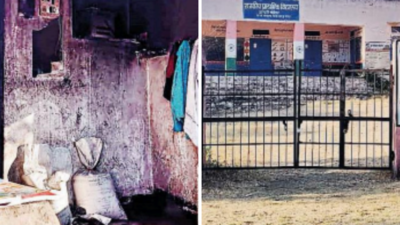Top Searches
- News
- City News
- jaipur News
- Latest mobiles, smartwatches, trendy shoes drive tribal kids to become child labourers in Udaipur
Latest mobiles, smartwatches, trendy shoes drive tribal kids to become child labourers in Udaipur

(L) Books lying on a table which were purchased for a boy who ran away from home to work as a child labour; a local government school (R) in Gogunda block of Udaipur
JAIPUR: Wearing 'cool' watch with a big dial, white sneakers and a fancy smartphone in hand, a former child labour from Gogunda block in Udaipur, who is now 17 is trying to pursue an employment opportunity in his own village.
This 17-year-old has already worked as a child labour for five years in different parts of Gujarat, with his last salary being Rs 7000. The boy willingly worked as a child labour because growing up it was a norm in his village to start earning one's own money after becoming a teenager.
Most young boys from villages in tribal belts of Udaipur district drop out of schools around the age of 10-12 and go to work as labour in restaurants, hostel canteens, office canteens, dhabas, in Gujarat as it helps them earn their own money, even if they are not able to support their families back home financially. Families also do not stop or protest child labour to a great extent as it is one less mouth to feed in a place where already there is no guarantee of where the next meal would come from.
"I had been working in Gujarat for the past six or seven years, starting from a roadside dhaba at first. The work hours were extensive, usually from 5am till 3pm and then again from 5pm till 1am, but we got three meals..." said Sohan (name changed) the 17-year-old who is now back in the village.
The young boys do get meagre salaries ranging between Rs 3000-7000, but only when they want to return home for festivals, while working for minimum 16 hours a day. They hide the reality of harsh working conditions when they come back to their villages, as they try to make a place for themselves in the society.
"Here, villages are scattered among the forests and road connectivity is still lacking for many areas. Due to this, many children either drop out from schools or enrolment is delayed as parents send their children only after they reach a certain age, because they have to walk long distances.
Meanwhile, boys in the village see that the teenagers who have returned after working in Gujarat, have fancy mobile phones, wearing good clothes, which is still a little foreign for them," said Gopilal Gameti, a teacher at a local government school in Gogunda.
With lack of employment and education opportunities in the tribal belts of Rajasthan, child labour is almost a way of life. "The idea that they (young boys) might also be able to have that lifestyle, is something that attracts them, and following that, they walk into child labour through agents or dealers...and mostly in the absence of their parents or guardian," added Gameti.
The cycle of child labour continues to propagate in these areas as if one wants to leave the circle, then they must give a substitute to the agents who deal with such labour between the two states.
"We either find someone who will work in our place or the agents convince locals to send someone to work, as otherwise they will lose out on money. When I wanted to come back, I did not have any substitute, so I did not even get my pending salary from my employer. I discreetly sold my phone at a nearby shop and came back home using that money," said Sohan.
In many cases, where Nata Pratha is practiced in the family, wherein the mother walks out of a marriage and chooses to live with another man, children from such marriages also choose to work as child labour to escape the humiliation or discrimination that they face from their peers.
Thirteen-year-old Suresh is one such child who went along with his friends to work as a child labour, after getting influenced by an agent for promises of good and regular meals like matar paneer or dal fry for working at a restaurant.
"Suresh's father died before the lockdown and his mother went with another man, but he stayed with us. He was even enrolled in school and got funds from the government for food and traveling also till school. In March, we got new notebooks, pencils, and books for him, but he had already left with some other boys of the village.
When he did not return for days, we started asking around and found that he was working as a cleaner somewhere in Anand district of Gujarat...the books are still lying unused," said Lekha Bai, (name changed) his 75-year-old grandmother, who was the only one home when Suresh left.
Suresh was traced by the efforts of a local NGO and his rescue process is underway, but his grandmother feels that a salary of Rs 3000 a month seemed like a better option to the boy than school, and was also an avenue to escape his peers who teased him after his mother left.
"We wanted to file a case against the man who took all these children, but when my elder son went to him after Suresh went missing to ask where he had taken my grandson, the agent just said that he already has cases against him, one more wouldn't make any difference to him...how can we get justice in such a situation?" asked the grandmother.
Locals working to stop cases of child labour, also said that at times, parents themselves push their children into labour as it is an easy way of earning money.
Durgaram Muwal, a government school teacher in Udaipur who has rescued over 400 child laborers, said that the primary reasons for children getting into labour is regular meals, a decent place to stay and escape poverty at home. Muwal was conferred with the national award on this Teacher's Day by President Draupadi Murmu for his continuous efforts.
This 17-year-old has already worked as a child labour for five years in different parts of Gujarat, with his last salary being Rs 7000. The boy willingly worked as a child labour because growing up it was a norm in his village to start earning one's own money after becoming a teenager.
Most young boys from villages in tribal belts of Udaipur district drop out of schools around the age of 10-12 and go to work as labour in restaurants, hostel canteens, office canteens, dhabas, in Gujarat as it helps them earn their own money, even if they are not able to support their families back home financially. Families also do not stop or protest child labour to a great extent as it is one less mouth to feed in a place where already there is no guarantee of where the next meal would come from.
"I had been working in Gujarat for the past six or seven years, starting from a roadside dhaba at first. The work hours were extensive, usually from 5am till 3pm and then again from 5pm till 1am, but we got three meals..." said Sohan (name changed) the 17-year-old who is now back in the village.
The young boys do get meagre salaries ranging between Rs 3000-7000, but only when they want to return home for festivals, while working for minimum 16 hours a day. They hide the reality of harsh working conditions when they come back to their villages, as they try to make a place for themselves in the society.
"Here, villages are scattered among the forests and road connectivity is still lacking for many areas. Due to this, many children either drop out from schools or enrolment is delayed as parents send their children only after they reach a certain age, because they have to walk long distances.
Meanwhile, boys in the village see that the teenagers who have returned after working in Gujarat, have fancy mobile phones, wearing good clothes, which is still a little foreign for them," said Gopilal Gameti, a teacher at a local government school in Gogunda.
With lack of employment and education opportunities in the tribal belts of Rajasthan, child labour is almost a way of life. "The idea that they (young boys) might also be able to have that lifestyle, is something that attracts them, and following that, they walk into child labour through agents or dealers...and mostly in the absence of their parents or guardian," added Gameti.
The cycle of child labour continues to propagate in these areas as if one wants to leave the circle, then they must give a substitute to the agents who deal with such labour between the two states.
"We either find someone who will work in our place or the agents convince locals to send someone to work, as otherwise they will lose out on money. When I wanted to come back, I did not have any substitute, so I did not even get my pending salary from my employer. I discreetly sold my phone at a nearby shop and came back home using that money," said Sohan.
In many cases, where Nata Pratha is practiced in the family, wherein the mother walks out of a marriage and chooses to live with another man, children from such marriages also choose to work as child labour to escape the humiliation or discrimination that they face from their peers.
Thirteen-year-old Suresh is one such child who went along with his friends to work as a child labour, after getting influenced by an agent for promises of good and regular meals like matar paneer or dal fry for working at a restaurant.
"Suresh's father died before the lockdown and his mother went with another man, but he stayed with us. He was even enrolled in school and got funds from the government for food and traveling also till school. In March, we got new notebooks, pencils, and books for him, but he had already left with some other boys of the village.
When he did not return for days, we started asking around and found that he was working as a cleaner somewhere in Anand district of Gujarat...the books are still lying unused," said Lekha Bai, (name changed) his 75-year-old grandmother, who was the only one home when Suresh left.
Suresh was traced by the efforts of a local NGO and his rescue process is underway, but his grandmother feels that a salary of Rs 3000 a month seemed like a better option to the boy than school, and was also an avenue to escape his peers who teased him after his mother left.
"We wanted to file a case against the man who took all these children, but when my elder son went to him after Suresh went missing to ask where he had taken my grandson, the agent just said that he already has cases against him, one more wouldn't make any difference to him...how can we get justice in such a situation?" asked the grandmother.
Locals working to stop cases of child labour, also said that at times, parents themselves push their children into labour as it is an easy way of earning money.
Durgaram Muwal, a government school teacher in Udaipur who has rescued over 400 child laborers, said that the primary reasons for children getting into labour is regular meals, a decent place to stay and escape poverty at home. Muwal was conferred with the national award on this Teacher's Day by President Draupadi Murmu for his continuous efforts.
FOLLOW US ON SOCIAL MEDIA
FacebookTwitterInstagramKOO APPYOUTUBE
Start a Conversation









